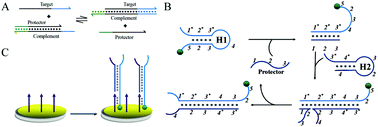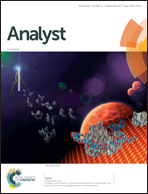An enzyme free electrochemical biosensor for sensitive detection of miRNA with a high discrimination factor by coupling the strand displacement reaction and catalytic hairpin assembly recycling†
Abstract
An isothermal, enzyme free, ultra-specific and ultra-sensitive protocol for electrochemical detection of miRNAs is proposed based on the toehold-mediated strand displacement reaction (SDR) and non-enzymatic catalytic hairpin reaction (CHA) recycling. The SDR was first triggered only in the presence of target miRNA and this process also affects other miRNA interferences having similar target sequences, thus guaranteeing a high discrimination factor and could be used in rare content miRNA detection with various amounts of interferences having similar target sequences. The output protector strand then triggered enzyme free CHA amplification and generates plenty of hairpin self-assembly products. This process in turn influences SDR equilibrium to move to the right and generates large amounts of protector output to ensure analysis sensitivity. Compared with traditional CHA, our proposed method greatly improved the signal to noise ratio and shows excellent performance in rare miRNA detection with miRNA analogue interference. Under the optimal experimental conditions and using square wave voltammetry, the established biosensor could detect target miRNA-21 down to 30 fM (S/N = 3) with a dynamic range from 100 fM to 2 nM, and discriminate rare target miRNA-21 from mismatched miRNA with high selectivity. This method holds great promise in miRNA detection from human cancer cell lines and would be a versatile and powerful tool for clinical molecular diagnostics.



 Please wait while we load your content...
Please wait while we load your content...